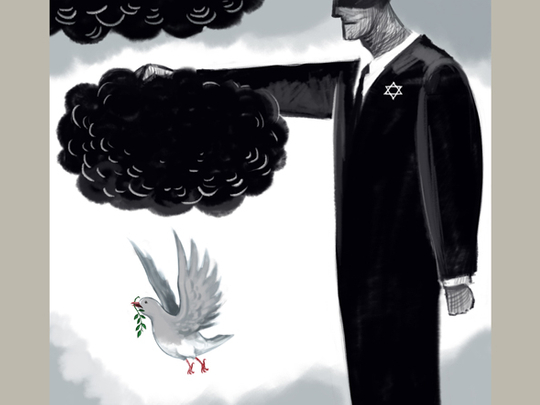
It is not often that we see US-Israeli relations go south — meaning that key officials from both sides are caught engaging in public acrimony. But over the past month or so, the US Secretary of State, John Kerry, has had his fair share of Israeli wrath, some bordering on insults. It has to do with his current efforts to reach a framework agreement between Israel and the Palestinians over final status issues. Since he took office early last year, Kerry has focused his attention to revive joint peace negotiations — a task that was both praised and attacked by the two embattled parties.
No one really knows what Kerry’s proposals are all about. There have been leaks from the Israelis, the Americans and the Palestinians. Some appear to be preposterous, while others are just replications of past ideas and suggestions. Initially, the talks would have gone on for nine months. But now, and under pressure from the US, the two sides have one of two options: To agree now on a framework agreement that would set the stage for a year-long negotiations reaching a final settlement on all issues or agreeing to extend talks beyond the April deadline. In both cases, the two sides must show some commitment to Kerry’s ideas on security, borders, occupied East Jerusalem, refugees, Jordan Valley, colonies and others. The two sides have a good idea of what Kerry is proposing. Else, they would not have expressed their reservation on a number of points. Still, Kerry’s proposals are yet to be submitted officially to both sides, in addition to Jordan, the Arab League and Saudi Arabia.
From a Palestinian point of view, Kerry’s plan is a dangerous one. It calls on the Palestinian National Authority (PNA) to recognise Israel as a Jewish state, thus negating the right of return for millions of Palestinian refugees and opening the way to possible demographic transfers of Arab Israelis living behind the green line. In addition, the plan is not specific about the Palestinian condition that occupied East Jerusalem be the capital of the future Palestinian state. It, apparently, perceives occupied East Jerusalem as an extension of Greater Jerusalem where small villages close to the Holy City could be considered as integral parts of it. Thus the Palestinian capital can be located in Abu Dis, a small enclave not far from the old walls of occupied Jerusalem. Special access to Muslim and Christian sites in the old city would be guaranteed.
The refugee issue will probably be resolved in accordance with the Bill Clinton plan — allowing few thousand Palestinians to return, but concentrating mostly on compensations and settlement of refugees in the host countries. The vast majority of Jewish colonies will be annexed by Israel while others will be abandoned. In most cases, the separation wall would be the de facto border line between Israel and the Palestinian state, in effect confiscating around one third of West Bank territory. The Jordan Valley will have a special security arrangement, with temporary Israeli military presence along with US or Nato forces coordinating with the Jordanian army. The Jordan Valley represents another third of West Bank territory where the PNA has conditional control. That will leave Palestinian population centres in the hands of the PNA to establish its Palestinian state. Nothing is mentioned of the Gaza Strip in Kerry’s plan, as far as we know.
Even though such proposals favour the Israeli position on security, borders and the right of hot pursuit in addition to total control of the skies, the Israelis appear hesitant to accept them. Prime Minister Benjamin Netanyahu has refused to endorse Kerry’s proposals. His Defence Minister, Moshe Yaalon, described Kerry as “obsessive” and “messianic” while Bayit Yehudi member of Knesset, Motti Yogev, from the ruling coalition, described Kerry as an anti-Semite.
And when Kerry, at the recently-held Munich security summit, warned Israel of possible economic boycotts over sabotaging the peace talks, he was immediately attacked and accused of holding a gun at Israel’s head and of being an anti-Semite!
In response, National Security Adviser Susan Rice tweeted that “Personal attacks in Israel directed at Sec Kerry totally unfounded and unacceptable”. Such response reminded pundits of the lack of chemistry between President Barack Obama and Netanyahu since both took office in 2009. Netanyahu responded to Kerry’s boycott threat by saying that he will never compromise on the security of Israel. In spite of Kerry’s tilted stance on the final colonies issues — he is clearly taking the Israeli side — the Israelis prefer to extend the status quo hoping that they would get more in the future. This is the only explanation for the recent attack on Kerry and his mission. The Palestinians are under tremendous pressure to accept what Kerry has to offer. It is not clear if they will accept it, though. Reactions from Ramallah show that President Mahmoud Abbas is not yet ready to embrace a deal that will do away with the right of return, give a symbolic presence in occupied East Jerusalem and allow Israel to govern in the Jordan Valley.
However, the Israeli reaction is the most important now. Netanyahu is trying to shift the emphasis from the Palestinian issue to the possible threat that Iran poses to Israel, even after Tehran’s nuclear deal with the West. The right-wing in Israel does not want to sign a deal with the Palestinians — now believing it can get more in the future. The US and the European Union want to conclude a final status deal. The current US-Israel showdown is an important development. For Palestinians, Jordanians and most Israelis, preserving the status quo is much better than accepting a raw deal today!
Osama Al Sharif is a journalist and political commentator based in Amman.










